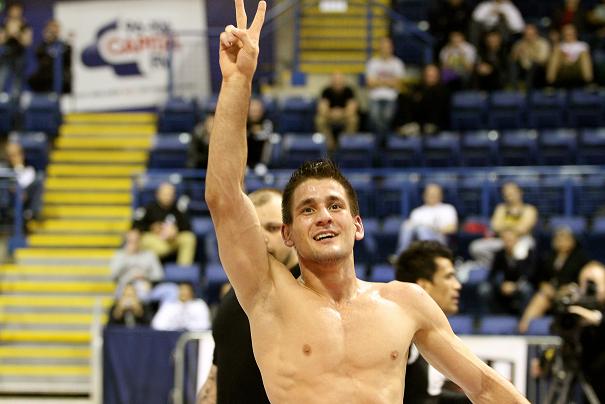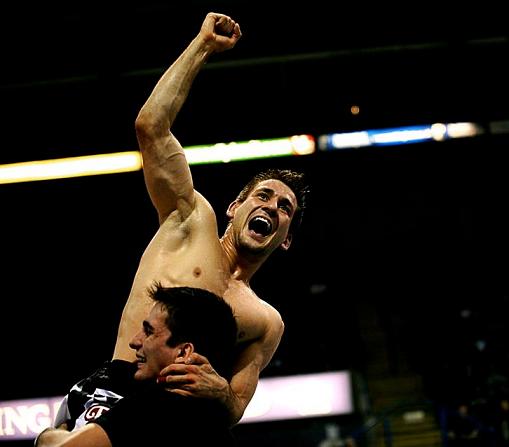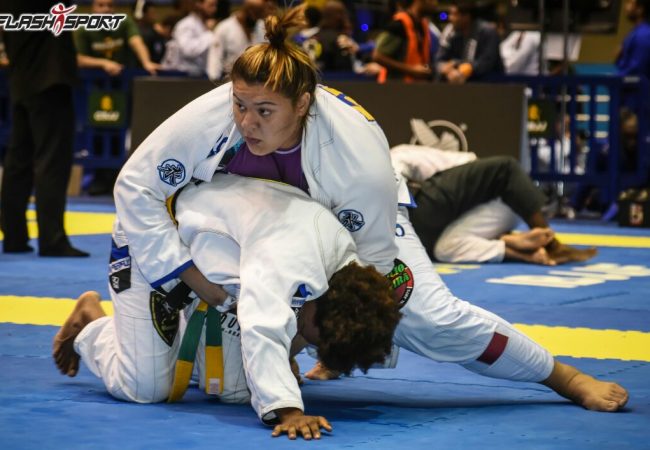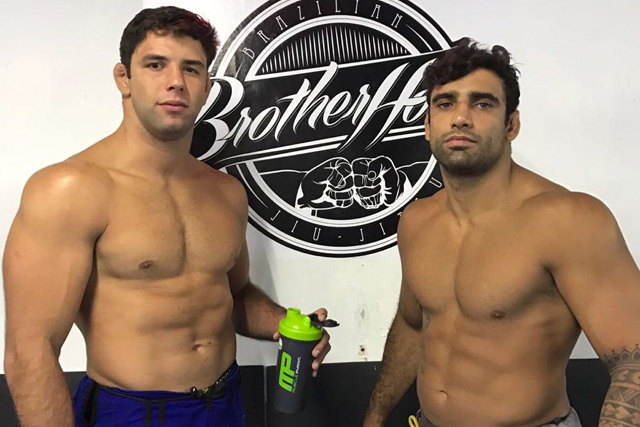Rafael Mendes continues his dominant march at the top of the world featherweight heap. The Atos ace won the world championship for the second time in a row, this year, and repeated the feat at the ADCC, again facing Rubens Cobrinha in a final charged with rivalry and touch of controversy. In a can’t-miss interview with GRACIEMAG.com, Rafael reflects on his career, reveals who his heroes are, discusses yet another decision outcome against Rubens “Cobrinha”, and tells what he will be up to for the rest of 2011. The black belt, of course, will figure prominently in the next issue of GRACIEMAG.
Here’s what he had to say:
What did it feel like to win a second title in such a competitive competition as the ADCC?
The night after the competition, I was in the hotel room lying down, thinking about life, with a feeling of great personal fulfillment, looking inside myself and remembering when I was a kid and started training Jiu-Jitsu at 11 years of age. At that time I was proud, didn’t want to lose to anybody, even while I was smaller and weaker than the others. I’d pushed myself hard, with much smaller goals but with the same drive to break boundaries that I have to this day. I was remembering the first time I made it into the magazine and how proud I made my family with each title I’d win and how happy I’d get and how much more motivated it would make me to train. Today, I feel much more mature and experienced, at 22 winning my second world championship and now second ADCC title, but I know it’s all just beginning. That could have been enough, but not for my dreams. I want to improve, be the best I can be, make it to an even greater level of technique than I’m at now. I want to be the greatest ever, and I know I have a lot of work to do to make that happen.
What was the hardest part of this ADCC?
For sure it was the training. When I’d think about how I couldn’t train anymore, that my body couldn’t take it, the people around me pushed me even harder, causing me to break the limits of what I had been able to do in the past. My training for the ADCC was perfect, I learned a lot. During training I knew I was a lot better than I was in 2009, so I went into the competition sure I was going to do better than I did in 2009. I owe a large part of this conquest to the people who helped me, as I know I wouldn’t have been able to achieve this goal without them, so I’m really grateful to all of them. I want to send out my thanks to my friends and training partners Calasans and Leandro Brassoloto, who trained with me the whole time, egged me on, made me evolve and taught me a lot, demanding that I evolve with every day in training. The diet wasn’t easy either; I had to lose four kilos, but thanks to my nutritionist, Marta Rochelle, and my physical conditioning coach, Thiago Mendes, I managed to show up strong and well prepared. I am so blessed to have these people by my side!
Is there any lesson in particular that you derived from this event?
Yes, the importance of the cornerman. In the final, when I got headbutted in my face, I remember I almost lost my cool and Guilherme looked and me and told me not to lose my head, to keep calm and focused on the match, and so I did. At that moment it was vital that he say that.
The final against Cobrinha was again determined by fine details. Was it better than in 2009?
For any event I go to I study the rules, and the ADCC is really cool because they call a questions-and-answers meeting where they explain the rules to all the athletes one day before the event. The referee explained that if you’re shooting for a takedown and the opponent falls, he won’t be awarded points during the first half of the match, since only negative points are counted. But if you’re opponent is taking you down and you pull closed guard, you’ll be awarded a negative point. And that’s what happened, I shot for his leg, was trying to get him down and he pulled closed guard. I didn’t take him down, he pulled closed guard; that was clear. I managed to get a copy of the match and, because he complained so much, I watched it a number of times to see what really happened. It was better than in 2009 for sure, since this time I managed to win during regulation time, with no overtimes. He’s good and will always be tough to face, that I knew; I tried to get the finish, attacked for the tapout the whole time, but Cobrinha is really flexible. I’m going to keep on training hard, so that next time I finish during normal time.
Tell us your thoughts on Galvão having won weight and open weight.
André is excellent and he showed it. He’s a heavy guy who moves like a featherweight. He was well trained and really sharp. He is to be congratulated; he was great, deserved the win; he put on another show. It was an incredible weekend.
What are your plans for the rest of 2011?
My schedule’s packed (laughs). Guilherme and I just got back from a seminar tour in Europe. We’re going to stick around home for a week before I go to Japan, where I’ll teach seminars for ten days and compete at the Rickson Cup. Then we’ll head to Australia for a seminar tour. Once that’s done, we’ll head to the USA, where we’ll train until December.
Who are the fighters to most influence you, the ones you look up to?
The ones who influenced me are the ones who trained with me, who taught me, mainly Ramon (Lemos), who taught and produced me. Nor can I leave out my brother (Guilherme), Bruno Frazatto and Gilbert Durinho. They made me a competitor and taught me a lot, too. There’s no way I can get in everybody, but everyone who has been training with me and in some way helping me to achieve my goals are responsible for my accomplishments. I remember all of them, from the lowest ranked to the black belts, as well as those who didn’t train with me but helped me in some way, like my family, girlfriend and friends. Who do I admire most? I’ll avoid the cliché by not naming anyone on the team: I admire Renzo (Gracie) for being who he is, beloved by all and a model of humility and charisma, as well as being a great fighter. He and Zé Mario had a great match, going into overtime, and the two went at it and showed that age doesn’t set back those who really know Jiu-Jitsu and love what they do.






